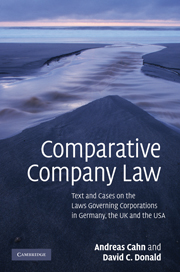 Comparative Company Law
Comparative Company Law Book contents
- Frontmatter
- Contents
- List of figures
- List of tables
- Preface and acknowledgments
- Glossary
- List of abbreviations
- Table of cases
- Table of legislation
- PART I The essential qualities of the corporation
- PART II The corporation and its capital
- PART III Governing the corporation
- SUBPART A The management
- 10 An introduction to the board and its governance
- 11 Directors' power to represent the company
- 12 Directors' duties of loyalty, good faith and care
- 13 Judicial review of management decisions (the business judgment rule)
- 14 Executive compensation
- 15 Directors' duties in listed companies
- SUBPART B The members
- PART IV Corporate combinations, groups and takeovers
- References
- Index
12 - Directors' duties of loyalty, good faith and care
from SUBPART A - The management
- Frontmatter
- Contents
- List of figures
- List of tables
- Preface and acknowledgments
- Glossary
- List of abbreviations
- Table of cases
- Table of legislation
- PART I The essential qualities of the corporation
- PART II The corporation and its capital
- PART III Governing the corporation
- SUBPART A The management
- 10 An introduction to the board and its governance
- 11 Directors' power to represent the company
- 12 Directors' duties of loyalty, good faith and care
- 13 Judicial review of management decisions (the business judgment rule)
- 14 Executive compensation
- 15 Directors' duties in listed companies
- SUBPART B The members
- PART IV Corporate combinations, groups and takeovers
- References
- Index
Summary
Required reading
D: AktG, §§ 82, 88, 93, 112, 116
UK: CA 2006, secs. 170–173, 175–180, 182, 187, 188, 190–192, 197–201, 217–219, 223; Insolvency Act 1986, sec. 214
US: Model Act, § 8.30 (including Comment) and §§ 8.60–8.63; DGCL, § 144
Directors' duty of loyalty
Rules, standards and fiduciary duties
The matters discussed in this chapter arise after shareholders have exercised their right to elect directors and the board is seated in office. Each of our three jurisdictions uses a mixture of rules and standards to guard against management incompetence and disloyalty. Each of the jurisdictions requires that managers act in accordance with the standards of due care (“duty of care” or Sorgfaltspflicht) and loyally (“duty of loyalty” or Treupflicht). A “standard of conduct” prescribes how a person should act or fulfill a function or task, and it operates as an open-ended measure against which the quality of performance can be assessed ex post. A “rule,” by contrast, names something specific that the management must do or not do. Standards flexibly adapt to acts and procedures that are not foreseen in their entirety when the standard is written, but standards can also create legal risks for directors because the scope of their requirements is often difficult to foresee. Rules, on the other hand, offer bright lines that are easy to apply, but for the same reason they can also be easy to evade – given that their parameters are clear and inflexible – unless they are arranged with sufficiently contiguous density, and often fail to account for changing circumstances.
- Type
- Chapter
- Information
- Comparative Company LawText and Cases on the Laws Governing Corporations in Germany, the UK and the USA, pp. 332 - 368Publisher: Cambridge University PressPrint publication year: 2010
- 1
- Cited by


